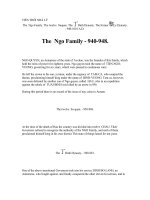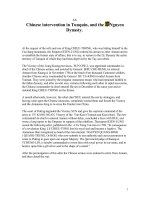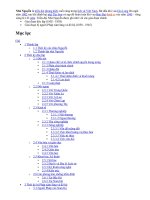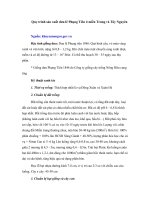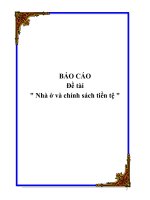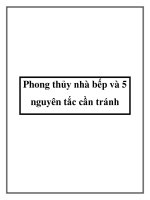33 TIỀN THỜI NHÀ MẠC VÀ CHÚA NGUYỄN XVIII
Bạn đang xem bản rút gọn của tài liệu. Xem và tải ngay bản đầy đủ của tài liệu tại đây (115.64 KB, 4 trang )
XVIII.
The Mac and Nguyen Governments.
The Mac family. 1527-1667.
MAC DAHG-DUNG. 1527-1530. In chapter XVI notice was taken of General Mac Dang-
Dung, who made away with the LE Dynasty and proclaimed himself king under the name
of MINH-DUC. Although numerous bands of rebels rose up in arms against him in nearly
every province, he at first reigned over the whole of Annam, having his capital at Hanoi.
No. 170. - Obverse: Minh-duc-nguyen-bao.
Reverse: plain. Iron coin issued by MAC DANG-DUNG.
No. 171. - Obverse: Minh-duc-thong-bao.
Reverse: The characters That-phan, indicating the weight of the coin. They are
written in the The-triem style. Copper coin issued by Mac Dang-dung.
1
MAC DANG-DINH (1530-1537) succeeded in 1530 through the abdication of his father
MAC DANG-DUNG. In 1536 the Emperor of China sent a commission to study the
political status of Annam, and in consequence of the report received he declared war
against the MAC. Mac Dang-ding died at the very time that the Chinese armies passed the
frontiers of the kingdom in 1537, and his father, resuming the management of affairs,
hurried to submit to the Imperial will, and declared himself to be a vassal of China- The
Emperor then divided the territories of Annam into two kingdoms, giving that of
Cochinchina to the LE family, and declaring Tunquin to be a feudatory state of China
under the government of the Mac.
No. 172. - Obverse: Dai-chanh-thong-bao.
Reverse: plain. Copper coin issued by MAC DANG-DINH.
MAC PHUOC-HAI. 1541-1546. As already shown, on the death of MAC DANG-DING,
his father MAC DANG-DUNG again took up the reins of government. He died in the
second moon of 1541, and his grandson Phuoc-hai succeeded him. This prince at once
asked for the confirmation of his power, which was granted him on the payment of a
valuable tribute. He was very unfortunate in his wars with the LE rulers in the south, and
lost several provinces in Tunquin.
No. 173. - Obverse: Quang-hoa-thong-bao.
Reverse: plain. Diminutive copper coin issued by MAC PHOOC-HAI.
2
No. 174. - Obverse: Same as before, but with the four characters written in the seal style.
Reverse: plain. Diminutive copper coin issued by Mac Phuoc-hai.
MAC PHUOC-HGYUEN. 1546-1561. - Was the son of PHUOC-HAI, and to hold the
throne, he had to fight against his younger brother Trung, who aspired to that position.
No. 175. - Obverse: Vinh-dinh-thong-bao.
Reverse: plain. Diminutive copper coin issued by MAC PHUOC-NGUYEN.
No. 176. - Obverse: Vinh-dinh-ti-bao.
Reverse: without rim. Diminutive copper coin issued by Mac Phuoc-nguyen.
MAC MAU-HIEP. 1561-1592. Was the son of the last-named ruler. In his wars against the
LE he lost his capital Hanoi, which he however reoccupied in 1573. Forgetting to take a
lesson by his past misfortunes, he gave himself up to pleasure, and paid no attention to the
great invasion of Tunquin which TRINH-TONG was then preparing. In 1592 he again lost
3
his capital, and was made a prisoner by the LE troops. Carried to Hanoi, MAU-HIEP was
condemned to be exposed to the sun in an iron cage for three days, and he was afterwards
sentenced to be put to death by being slowly cut to pieces.
MAC TUYEN. 1592. - His father MAU-HIEP had abdicated in his favour sometime
before having been made a prisoner. TUYEN was not less unfortunate, however, for his
troops were defeated by the LE armies. Soon after his accession be was made a prisoner
and murdered.
MAC KING-CHI. 1592-1593. This prince came to power by the death of TUYEN. He
assembled the dispersed bands of his troops and formed in Dong-trieu an army of seventy
thousand men, with whom he defeated the forces sent against him by TRINH-TONG. But
fortune soon turned against him, and in the first moon of 1593 his army was utterly
defeated, and he himself made a prisoner by the royal LE troops.
MAC KING-CUNG. 1593-1616. The rest of MAC'S army retired to the North of Tunquin,
establishing the court and their camps in Van-ninh. Thence they began to devastate the
territories of the LE, and became so troublesome that the king had to appeal to the Lord
NGUYEN for help. With his aid the royal troops defeated the MAC several times, but the
power of these Lords becoming very feeble, they appealed to the Emperor of China,
accusing the Lords TRINH of having usurped the royal authority and making use of the
name of the Le Dynasty merely to screen their position as real rulers of the country. The
Emperor again despatched a Commission to Annam, and after hearing its report in 1598, he
gave to the Mac family the sovereignty over the two provinces of Thai-nguyen and Cao-
bang.
From this time the Lords MAC lost all their importance, and could only maintain
themselves in their small territory by the help they received from China. They attempted
the invasion of Tunquin on several occasions, but were always defeated, and in 1667 they
were finally driven away from Cao-bang by TRINH-TAC. They reappeared as Invaders of
Tunquin in the same year, but their army, composed of undisciplined Chinese bands, was
completely routed; and the Emperor of China put an end to their last hopes by ordering
them away from the Annamese frontiers.
4

